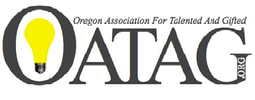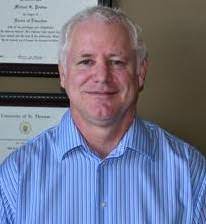OUR ANNUAL CONFERENCE
will be held
OCTOBER 7, 2023
|
Conference Quick Links
Online registration ends 30 Sept 2023. Walk-in registrations will be accepted at the door, but lunch is not guaranteed. Walk-in payment with credit card or check will be accepted. No Cash please.
Volunteers are needed on the day of the conference. Volunteers receive free registration. Contact OATAG's President (president@oatag.org) or Secretary (secretary@oatag.org) for more information. |
|
Keynote Speakers Links
|
Keynote Speaker Bio
Dr. Michael Postma is a teacher, administrator, consultant, speaker, and author dedicated to the holistic development of both gifted and twice-exceptional children through his company Gifted & Thriving, LLC. Over the last two decades, Dr. Postma has worked in the field of gifted/talented education as both a teacher and administrator in the public and charter school system in Minnesota and North Carolina, and was the architect of the Minnetonka Navigator Program, a magnet school specifically designed for highly gifted and twice-exceptional students. Dr. Postma was also the Executive Director of SENG from 2017-2019 and Director of Programming until 2022. Dr. Postma has published a number of articles and two books, the latest titled The Inconvenient Student: Critical Issues in the Identification and Education of Twice Exceptional Students. He travels and speaks nationally and internationally on a variety of topics such as: the social/emotional development of the gifted, understanding twice-exceptional learners, gifted/talented programming, neuroscience and the gifted/2e brain, and school related topics from understanding assessment to quality instruction for gifted/2e learners. He currently lives in Bellingham, WA and is the father of four children, three of whom are twice-exceptional.
Dr. Michael Postma is a teacher, administrator, consultant, speaker, and author dedicated to the holistic development of both gifted and twice-exceptional children through his company Gifted & Thriving, LLC. Over the last two decades, Dr. Postma has worked in the field of gifted/talented education as both a teacher and administrator in the public and charter school system in Minnesota and North Carolina, and was the architect of the Minnetonka Navigator Program, a magnet school specifically designed for highly gifted and twice-exceptional students. Dr. Postma was also the Executive Director of SENG from 2017-2019 and Director of Programming until 2022. Dr. Postma has published a number of articles and two books, the latest titled The Inconvenient Student: Critical Issues in the Identification and Education of Twice Exceptional Students. He travels and speaks nationally and internationally on a variety of topics such as: the social/emotional development of the gifted, understanding twice-exceptional learners, gifted/talented programming, neuroscience and the gifted/2e brain, and school related topics from understanding assessment to quality instruction for gifted/2e learners. He currently lives in Bellingham, WA and is the father of four children, three of whom are twice-exceptional.
Keynote: Anxiety and its Impact on G/2e Children, Teens, and Young Adults
Synopsis: Living in an uncertain world, today’s children are more anxious than ever. In fact, 1 of every 5 male high-schoolers struggles with chronic anxiety. Within the Gifted/2e population that number is much higher. In this session, Dr. Mike Postma explores how anxiety affects 2E students and what parents and professionals can do to help reduce their worries and nurture growth mindsets. After reviewing the biology, psychology and common sources of anxiety, they will show you how to help 2E children and teens change their relationship to worry, realistically evaluate situations and tolerate unpredictability. You’ll learn practical, useful tools to promote self-soothing and calming down, diminish negative thoughts and inner critics and build lasting strategies for bouncing back and resilience.
Breakout #1: Understanding Executive Functioning and the G/2e Student
Synopsis: The root cause of executive functioning deficits in your child can be found in asynchronous development. Intense sensory development accompanied by intense limbic growth can inhibit social and emotional regulation which in turn affects the proper growth of executive functioning skills. These skills need to be deliberately taught to neurodiverse students alongside academic pursuits. This session will address the root cause of executive functioning deficits and provide strategies to improve those same skills. [intended audience: parents all levels]
Breakout #2: “The Twice-Exceptional Brain”
Synopsis: Twice-exceptional (2e) children experience atypical brain development that affects how they interact within different situational contexts (i.e., school, relationships, communications, home, work, etc.). Experts refer to this as asynchrony given the difference in growth rates between intellectual and social/emotional maturity. In order to truly understand the twice-exceptional person, one must understand this atypical brain development and how it impacts the development of schema (the understanding of self and how one fits into the world). This webinar will examine this atypical neurodevelopment and illuminate strategies on how to better understand and serve the twice-exceptional child/student at home and in the classroom. Join Dr. Michael Postma as he explores the intricacies of the 2e brain.
[Intended audience: parents, teachers, all levels]
Synopsis: Living in an uncertain world, today’s children are more anxious than ever. In fact, 1 of every 5 male high-schoolers struggles with chronic anxiety. Within the Gifted/2e population that number is much higher. In this session, Dr. Mike Postma explores how anxiety affects 2E students and what parents and professionals can do to help reduce their worries and nurture growth mindsets. After reviewing the biology, psychology and common sources of anxiety, they will show you how to help 2E children and teens change their relationship to worry, realistically evaluate situations and tolerate unpredictability. You’ll learn practical, useful tools to promote self-soothing and calming down, diminish negative thoughts and inner critics and build lasting strategies for bouncing back and resilience.
Breakout #1: Understanding Executive Functioning and the G/2e Student
Synopsis: The root cause of executive functioning deficits in your child can be found in asynchronous development. Intense sensory development accompanied by intense limbic growth can inhibit social and emotional regulation which in turn affects the proper growth of executive functioning skills. These skills need to be deliberately taught to neurodiverse students alongside academic pursuits. This session will address the root cause of executive functioning deficits and provide strategies to improve those same skills. [intended audience: parents all levels]
Breakout #2: “The Twice-Exceptional Brain”
Synopsis: Twice-exceptional (2e) children experience atypical brain development that affects how they interact within different situational contexts (i.e., school, relationships, communications, home, work, etc.). Experts refer to this as asynchrony given the difference in growth rates between intellectual and social/emotional maturity. In order to truly understand the twice-exceptional person, one must understand this atypical brain development and how it impacts the development of schema (the understanding of self and how one fits into the world). This webinar will examine this atypical neurodevelopment and illuminate strategies on how to better understand and serve the twice-exceptional child/student at home and in the classroom. Join Dr. Michael Postma as he explores the intricacies of the 2e brain.
[Intended audience: parents, teachers, all levels]
Vertical Divider



